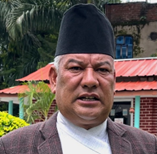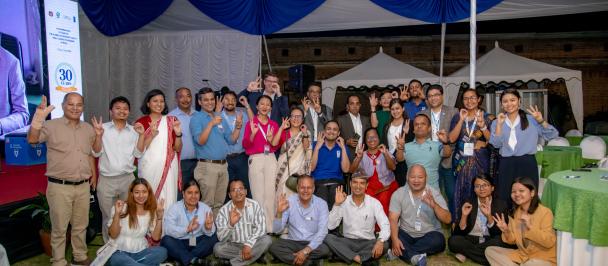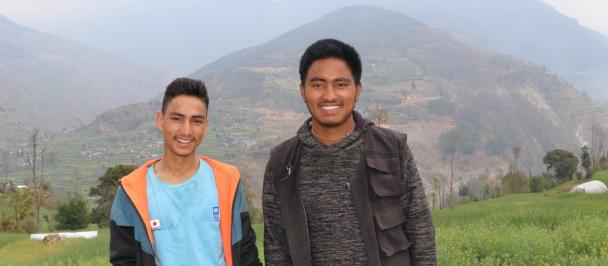Community engagement and ownership making local development plans sustainable
December 4, 2023

Local governments (LGs) in Karnali Province were facing challenges in conducting settlement-level planning process, which is an important part of the legally required seven-step annual planning. Of the 79 LGs in Karnali Province, most LGs were not able to fulfil the required procedures while those that had achieved relative success with the planning process, representation of women and diverse social groups such as Dalits, indigenous people and persons with disability was low.
The European Union Support to Inclusive Federalism (EUSIF) identified this gap in the local-level planning process and supported three LGs of Karnali Province - Tila Rural Municipality, Soru Rural Municipality and Dullu Municipality – in collaboration with another UNDP project, the Local Infrastructure Support Programme (LISP), to conduct simulation and role play exercises as part of their settlement-level planning. The project ensured broad participation of social groups including women and Dalits as well as community-based Organizations (CBOs) in the exercise. LG officials themselves identified and selected plans during the consultation with community members. This kind of participatory, real-time planning proved to an opportunity for the elected officials and the municipal staff to better understand the development needs of the citizens but also contributed to making community members aware of their role in the planning the process.

Dharma Bahadur Shahi, Chairperson, Soru Rural Municipality
“Despite our best efforts we were not able to meet the planning guidelines due to limited knowledge and capacity. Support from EUSIF and LISP in conducting simulation exercises and orientations helped us to understand the diverse needs of people, which were integrated into the Rural Municipality’s annual plans.”
Local ownership is key to sustainability of municipal planning
A perception survey conducted during the planning exercise showed 60% increase in the participation of community people in this year’s settlement-level planning as compared to the FY 2022-23. This meant the the LGs needed to work more to ensure maximum participation of the diverse community groups in the selection of development projects. Furthermore, community members who participated in the planning simulation and orientation sessions expressed strong desire to voice their issues and be part of the development process.
Rajkina Sarki, a Dalit executive member from Ward No 4, Tila Rural Municipality, complains about the trend of municipal budget being distributed to wards on pro rata basis without proper needs assessment. According to her, this kind of practice has led to many imbalances in terms of prioritization of development programmes and the outcomes. “After attending the planning simulation and orientation I understood that budget allocation must take indicators such as population, poverty index, human development index, and social inclusion into consideration,” she said, adding, “The learning from these planning exercises was that all stakeholders, specially community people, should have stake in the selection of development projects and the local government must ensure that.”
Dr Som Lal Subedi, an expert in federalized governance, says meaningful civic participation at the local level is the essence of grassroots democracy. It promotes accountability and helps to materialize fundamental rights stipulated in Nepal’s Constitution.
“Seven-step planning process is the backbone of local governance. Ensuring sufficient community participation is a responsibility of the local government as envisioned by the Local Government Operation Act 2018,” he explains, “In addition, people’s participation is the only popular model of keeping the local government in check. Efficiency, priority-setting, budget allocation, expenditure credibility and transparency are largely the outcome of people’s participation. Seven-step planning process should be appropriately followed to ensure inclusive municipal service delivery.”
Improving municipal accountability
This intervention improved the accountability of LGs and made the planning more need-based and inclusive. It also enhanced the knowledge and skills of elected representatives, staff, CBOs and community members on the planning process and improved the ownership and accountability of local governments and their constituents thereby making this approach sustainable. 275 LG officials including elected representatives were capacitated and more than 2500 local people including over 46 percent women and 20 percent Dalits were engaged. The simulation and role play methodologies were executed by putting gender equality and social inclusion (GESI) at the centre. The three LGs now fully own the process and have stated their intent to apply this approach during the next planning cycle.

Chandi Kumari Rawat, Tila Rural Municipality
“Nobody came to us asking about our problems and needs before. This is the first time we are seeing local officials coming to our locality to select development projects. We have now understood that ordinary citizen like me do have a voice in the planning process.” - Chandi Kumari Rawat, Tila Rural Municipality
High scope for scalability
As simulation and role play have been successfully executed and well-documented in three LGs in the planning context, resulting in high civic engagement and clear buy-in from municipal leadership it can be scaled in other LGs of Karnali as well as other provinces. This is because the challenges with local-level planning process remain similar in many other LGs.
***

 Locations
Locations



